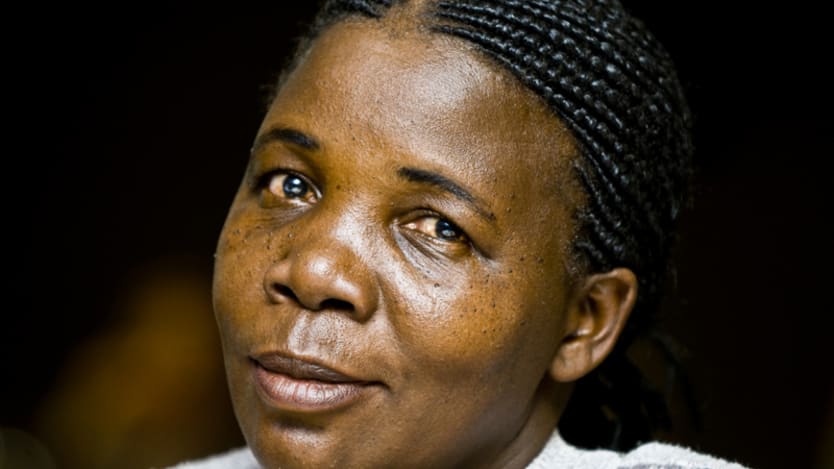
When I met Constance Okollet, a farmer from eastern Uganda a few years back, her community had been destroyed by floods and then ravaged by dramatic drought, the likes of which they had never seen. They were so perplexed by what was happening, they thought God was mad at them.
And it’s not just Constance. Smallholder farmers we work with around the world are reporting that increasingly unpredictable and extreme weather is making it harder for them to know when to plant their seeds and harvest, while some crops no longer grow as they used to.
“It’s difficult to know what each year will be like,” Bounthit Inthavong, a farmer in Vientiane province of Laos, told Oxfam. “I’m worried about the future because the weather really affects farmers. You plan to plant, you invest, and then if it is too hot or the heavy rains come, you lose.”
Food security and livelihoods at stake
Farmers in developing countries, like Constance and Bounthit, are perilously exposed to changes in the climate. Too much or too little rain can be the difference between having enough food, or fighting hunger.
Women are often the worst affected, as they disproportionately depend on agriculture to earn a living and feed their families, but also face inequalities in their efforts to produce food. They also often eat last and least so their families can eat, and they tend to have less resources and access to land than men.
And the climate is only likely to get worse. The El Niño currently unfolding is one of the strongest ever recorded. It will reach its maximum strength between now and January, and it will mean more unpredictable weather conditions that will impact people’s food security, lives and livelihoods around the world.
Harvests and livelihoods have already faltered as drought has taken hold across equatorial regions — in Ethiopia, much of southern Africa, the spine of Central America and parts of the Caribbean, South America, Asia and the Pacific. Oxfam estimates that by early next year, between 40 million and 50 million people across the world are likely to be facing hunger, water shortages and disease.
Invest in resilience
Increasing climate chaos will pose a serious threat to the stability of the global food system and increase humanitarian emergencies at a time when resources and capacity are already under enormous strain. Which is why it’s so important for negotiators in at the Paris climate change conference to get to a good deal that will not only reduce the dangerous greenhouse gas emissions causing this climate chaos, but also invest in the resiliency of the poorest people who are on the front lines.
As the climate shifts, small-scale farmers will need support to adapt their agricultural methods so that they are more productive and resilient. Techniques like integrated pest management, crop rotation, agro-forestry and more efficient water management are needed. Women farmers will need access to information, education, and training to master these agricultural practices and to harness the power of their knowledge and ideas.
Oxfam has been working on strengthening farmer resilience through programs like System of Rice Intensification, an agro-ecological approach to improving the productivity of rice. Using a set of practices that involves changes to the way plants soil and water are managed — such as different planting patterns and curbing chemical fertilizers — SRI encourages local adaption and farmer innovations through peer learning and farmer-led exchanges. SRI practices are now in over 50 countries, including leading rice producing countries like Indonesia, Vietnam and Cambodia.
Managing the impacts of climate change
Together with the World Food Program, Oxfam has also developed the R4 Rural Resilience Initiative, which gives farmers and rural families a new way to manage some of the risks they face from increasingly erratic weather. The initiative offers households access to drought insurance and credit, facilitates work on environmental projects that strengthen communities, and encourages families to save. Empowered with these risk-management tools, families can develop resilience to climate change and the challenges it presents to their food security and long-term well-being.
By supporting climate resilience for poor farming communities — of which SRI and R4 are just two of many — we can improve their access to food and ways of earning a living through agriculture. A resilient farm can cope effectively with climate shocks such as droughts or floods, continuing to produce and sustain its capacity for future responsiveness and production.
Farmers who deal with climate impacts first and worst are the ones who have most at stake at the Paris COP21 climate conference. For them, the expected agreement must increase the financial support to help them cope with an already changing climate. Progress has been slow, with financial support falling far short of what is needed, especially for adaptation
At COP21, progress must speed up. Developed countries must demonstrate how they will meet their existing commitments to jointly mobilize $100 billion a year by 2020 for climate action in poor countries, helping small-scale food producers adapt and build new agricultural practices.
Climate change is one of the biggest threats to poor people’s lives and livelihoods. We must ensure those who are on the frontlines of extreme weather impacts — including this year’s super El Niño — are able to build their resilience and adapt to our changing climate.
We must do it for Constance and Bounthit — and for millions of farmers like them around the world.
Planet Worth is a global conversation in partnership with Abt Associates, Chemonics, HELVETAS, Tetra Tech, the U.N. Development Program and Zurich, exploring leading solutions in the fight against climate change, while highlighting the champions of climate adaptation amid emerging global challenges. Visit the campaign site and join the conversation using #PlanetWorth.








